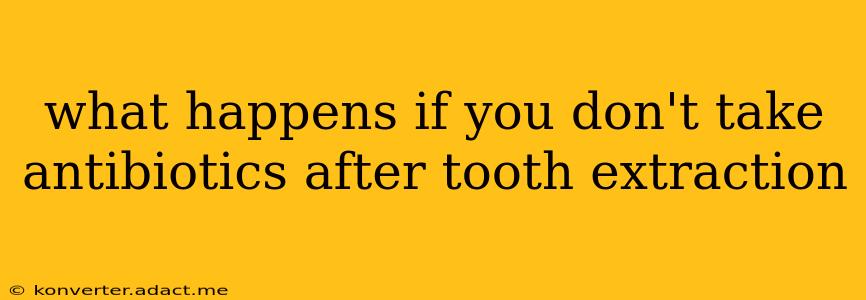Tooth extraction, while a common procedure, carries a risk of infection if proper post-operative care isn't followed. A common question many patients have is: what happens if you don't take antibiotics after a tooth extraction? The answer isn't straightforward, as it depends on several factors, including the complexity of the extraction, the patient's overall health, and their oral hygiene practices. However, understanding the potential consequences is crucial for making informed decisions about your post-operative care.
Understanding the Role of Antibiotics in Tooth Extraction
Antibiotics aren't routinely prescribed after every tooth extraction. They are generally reserved for cases where the risk of infection is significantly higher, such as:
- Complex extractions: Extractions involving impacted wisdom teeth or teeth that are severely damaged or infected often increase the risk of post-operative complications, making antibiotics a more likely prescription.
- Compromised immune system: Patients with weakened immune systems, such as those undergoing chemotherapy or with chronic illnesses, are at a greater risk of infection and might benefit from prophylactic antibiotics.
- Presence of infection: If an infection is already present at the extraction site before the procedure, antibiotics are almost always necessary.
What Could Happen Without Antibiotics?
If you don't take prescribed antibiotics after a tooth extraction and an infection develops, you might experience several symptoms, including:
- Increased pain and swelling: The pain and swelling you experience after the procedure could worsen significantly.
- Fever and chills: A systemic infection can manifest as a fever and chills, indicating that the infection has spread beyond the extraction site.
- Bad breath: A persistent bad breath (halitosis) can be a sign of an infection developing in your mouth.
- Pus formation: Pus formation at the extraction site is a clear indication of infection.
- Dry socket: While not directly caused by neglecting antibiotic use, dry socket (alveolar osteitis), a painful condition where the blood clot is lost from the extraction site, is more likely to become infected if antibiotics aren't taken when prescribed.
What if I'm concerned about taking antibiotics?
Many patients have concerns about the overuse of antibiotics and their potential side effects. It's essential to discuss any concerns with your dentist or oral surgeon. They can explain the risks and benefits of antibiotics in your specific situation. They may suggest alternative management strategies, such as close monitoring and careful oral hygiene.
How Can I Prevent Infection After Tooth Extraction?
Even without antibiotics, you can significantly reduce your risk of infection by diligently following your dentist's post-operative instructions:
- Maintain meticulous oral hygiene: Gently rinse your mouth with salt water several times a day.
- Avoid smoking: Smoking significantly impairs healing and increases the risk of infection.
- Avoid using a straw: Using a straw can dislodge the blood clot, increasing the risk of dry socket.
- Avoid strenuous activities: Give your body time to heal.
- Follow your dentist's instructions: Carefully follow all instructions regarding pain medication, diet, and activity levels.
What are the common side effects of antibiotics?
Common side effects of antibiotics include nausea, diarrhea, and stomach upset. More serious side effects are rare but possible. It is important to discuss any concerns about side effects with your doctor or dentist before taking antibiotics.
When should I contact my dentist or oral surgeon?
Contact your dentist or oral surgeon immediately if you experience any of the following symptoms:
- Severe pain
- Increased swelling
- High fever
- Pus formation at the extraction site
- Difficulty breathing or swallowing
Remember, preventative measures and proper post-operative care are crucial for a smooth recovery after tooth extraction. While antibiotics play a role in preventing and treating infection in certain cases, diligent oral hygiene and adherence to your dentist's instructions are essential regardless of antibiotic use. Always discuss your concerns and specific situation with your dental professional for personalized advice.
